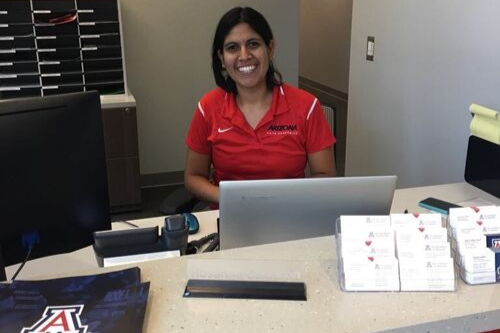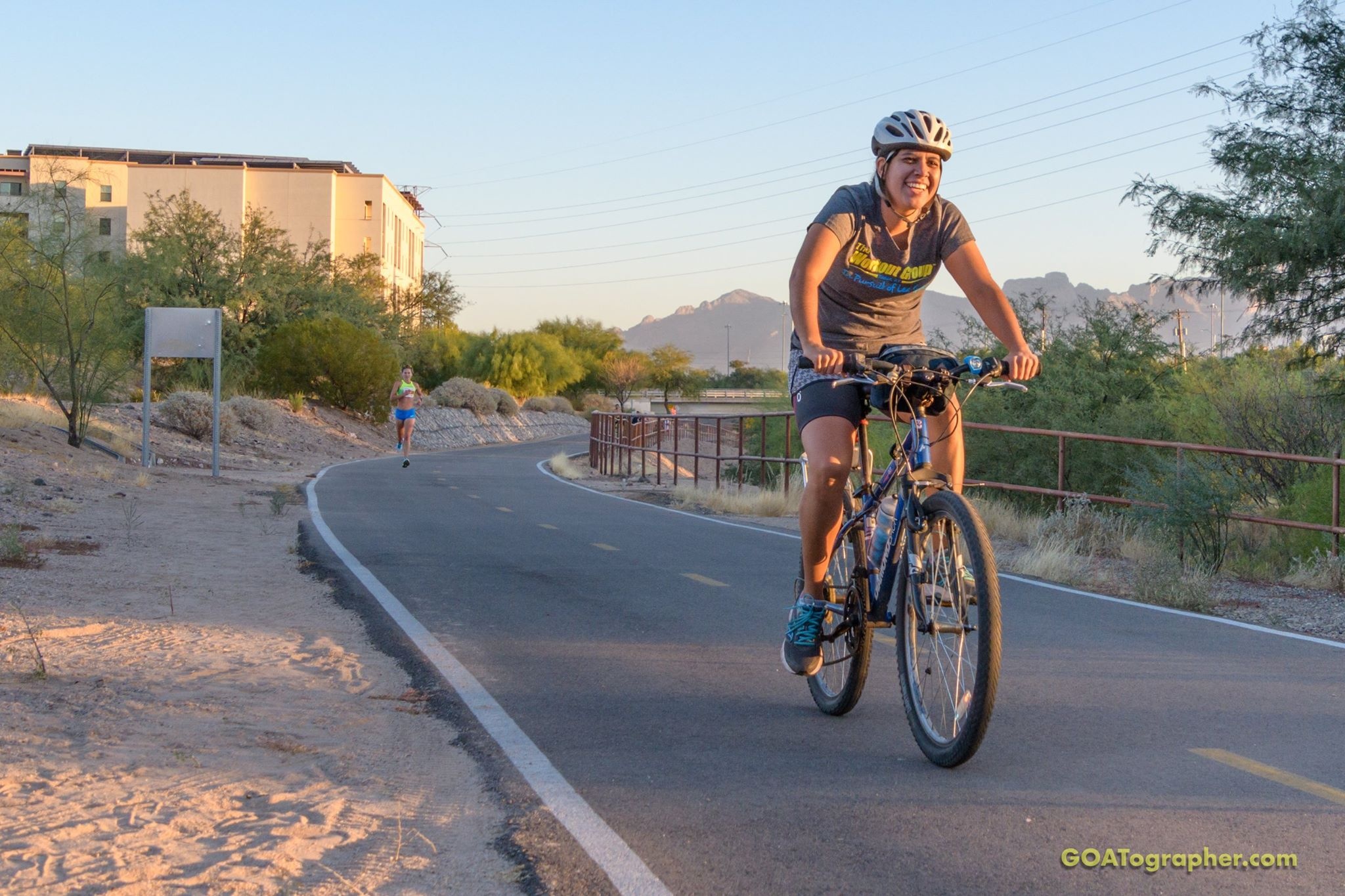
AIChE presents the most recent post in this series featuring LGBTQ+ engineers and their allies as part of an ongoing effort to bring about inclusion and diversity. Other related efforts include the LGBTQ+ Inclusion in Engineering (Workshop & Panel), held at the 2018 Annual Meeting, and leadership receptions for LGBTQ+ members and allies. The upcoming LGBTQ+ Inclusion in Engineering (Workshop & Panel) will take place at the Annual Meeting on November 12, 2019. Learn more here.
All aforementioned initiatives are supported by the AIChE Foundation's Doing a World of Good Campaign. In the tenth installment of our series, we interviewed Itzel Marquez, who shared her story as an LGBTQ+ STEM professional working at Central Michigan University.
Where did you complete your chemical engineering education?
I completed my Bachelor’s and Master’s in Chemical Engineering in Mexico at Universidad de las Americas Puebla. I finished my PhD in Chemical Engineering at the University of Arizona.
How many years have you been a member of AIChE?
Two years.
Tell us a bit about your job and your job responsibilities. What’s a typical day at work?
I am an assistant professor in environmental engineering at CMU. I'm a chemical engineer, but my research has always been focused on environmental topics that I'm very passionate about. I am just starting out in my current position so, right now, my responsibilities are to teach my classes and to develop a research lab.
On a regular day, my tasks can range from ordering lab supplies, and developing mathematical and kinetic models, to writing research papers, making PowerPoint drawings for my classes, and installing new equipment in the lab. This is one of the things I most enjoy about my job because it doesn’t get boring. Also, the interactions with the students always keep me motivated.
I have a pride flag in my office, an AIChE Safe Zone sticker on my door, and my pronouns are listed on my business cards. I also have a diversity statement in the syllabus of my classes. I do it because I want any LGBTQ+ student who stops by my office to feel safe.
Tell us a bit about your experience as an out LGBTQ+ professional working in engineering.
I came out professionally when I was in the second year of my PhD. Before that, I didn’t really feel safe to come out for several reasons, but I feel like the academic environment is particularly inclusive.
At the University of Arizona was when I first felt safe coming out. Once I came out, I was determined to never go back in the closet, so when I finished my degree and started looking for other institutions to work, I made sure to find one where I didn’t need to hide. I was very lucky to find CMU. They have been very welcoming from the beginning and I feel great working here.
 Here, Itzel is pictured tutoring student athletes.
Here, Itzel is pictured tutoring student athletes.
What are the most important issues that LGBTQ+ engineers deal with in the workplace today?
I think the lack of diversity is still a big problem within engineering departments in academic institutions. To clarify, I mean diversity in terms of race, abilities, and the whole umbrella of sexual identities. It concerns me because I have seen improvement in other areas like chemistry or health sciences, but there are certain areas in engineering where this conversation hasn’t even started.
Sometimes in engineering, we are so focused on our area of expertise that we forget about social issues. Excluding minorities and their insights makes our ideas very narrow.
Do you know others in the profession who struggle with being out in today's workplace?
Like I said, I feel very privileged in the academic environment, where being out is more the norm than the exception. Many of my friends here in the US are out as well, however, most of my friends in Mexico are not. They are afraid of being fired if they come out, and the law will not necessarily protect them. We are struggling a lot with inclusion in Mexico in that sense. We're making progress slowly, but very few people are out in the workplace. This, of course, takes a toll on their performance.
How can people help foster a more inclusive environment for LGBTQ+ chemical engineers?
By being visible and outspoken to the extent of their comfort and safety. If you're an ally, but no one knows, it will be hard for those who need your support to find you or even feel safe around you. I have a pride flag in my office, an AIChE Safe Zone sticker on my door, and my pronouns are listed on my business cards. I also have a diversity statement in the syllabus of my classes. I do it because I want any LGBTQ+ student who stops by my office to feel safe. Whether they are out or not, at least they know they can be themselves when they are on campus. I don’t want any of my students to feel the way I felt back in Mexico.
Does your organization do anything to foster inclusivity for LGBTQ+ people? If so, please describe.
A lot! There is the Office of LGBTQ+ Services where you can find all kinds of resources: discussion panels, workshops, celebrations and, most of all, support. So, no matter where you are in the process of finding your identity or coming out, you can find help and support in the office.
Do you have any suggestions of what out LGBTQ+ chemical engineers can do to help make their professional climate more safe, welcoming, and inclusive for diverse engineers?
The fact that we are a minority does not make us immune to having unconscious or even conscious bias. So, I think we must first be aware that we also have biases against other people and need to address them. I'm not just talking about LGBTQ+ discrimination, but also discrimination based on abilities, ethnicities, religious beliefs, etc. I don’t think we need to be out to be more inclusive; we can do that with every person we work with by treating them all with respect.
Tell us a bit about your personal life.
Like I said, I am originally from Mexico and I have been living in the US for six years. My spouse and I met in college in Mexico and we came here together for grad school.
We like running and hiking very much, so we are outside every time we have an opportunity. We're always looking for new places to know. I also like reading a lot and I listen to a lot of podcasts, including the Doing a World of Good podcast.
 Itzel riding her bike on the Tucson paths.
Itzel riding her bike on the Tucson paths.
Are there any LGBTQ+ inspirations, role models, or moments in history that are important to you?
When same-sex marriage became legal across the US. My spouse and I have always been very confident about our love and commitment, but we had seen before how the partners of some of our friends were negatively affected in the case of death. They would get completely excluded from medical, legal, or financial decisions. That was one of our biggest fears as a same-sex couple. But with same-sex marriage recognized, that can't happen anymore. We now know that we can be legally recognized as a couple, which, more than anything, means we have rights and we are protected if something happens.
Do you have a story you'd like to share about an effective or inspirational professional ally?
My office mates during my PhD were always wonderful to me. They were some of the first people I came out to, and the support they showed really made me feel safer and prouder of who I was. They even started educating themselves about the topic, and that meant a lot to me and gave me courage.
What’s your dream getaway?
I have always wanted to go rafting in the Grand Canyon for a few days. My spouse and I are also dying to visit Australia.
Who is your favorite LGBTQ+ icon?
I follow Dr JJ Elridge on twitter @astro_jje. She is an inspiring woman who isn't afraid of being vulnerable and open to people, and also isn't scared of being honest.
Gaydar: Does it exist?
Yes, but it is not perfect.
Join AIChE's LGBTQ+ & Allies Online Community
This community is open to professional AIChE members who are LGBTQ+ and allies. Topics of discussion will include the ongoing development of LGBTQ+ initiatives within AIChE, plus issues concerning, and opportunities for, LGBTQ+ chemical engineering professionals.
Learn more about the community.
Learn more about AIChE's Diversity and Inclusion Initiatives.
Interested in helping?
Are you an LGBTQ+ chemical engineer and AIChE member interested in sharing your story to help create awareness around diversity and inclusion? Are you an LGBTQ+ ally interested in helping with diversity and inclusion efforts? Send us a note at chenected@aiche.org with the subject "Diversity and Inclusion."


